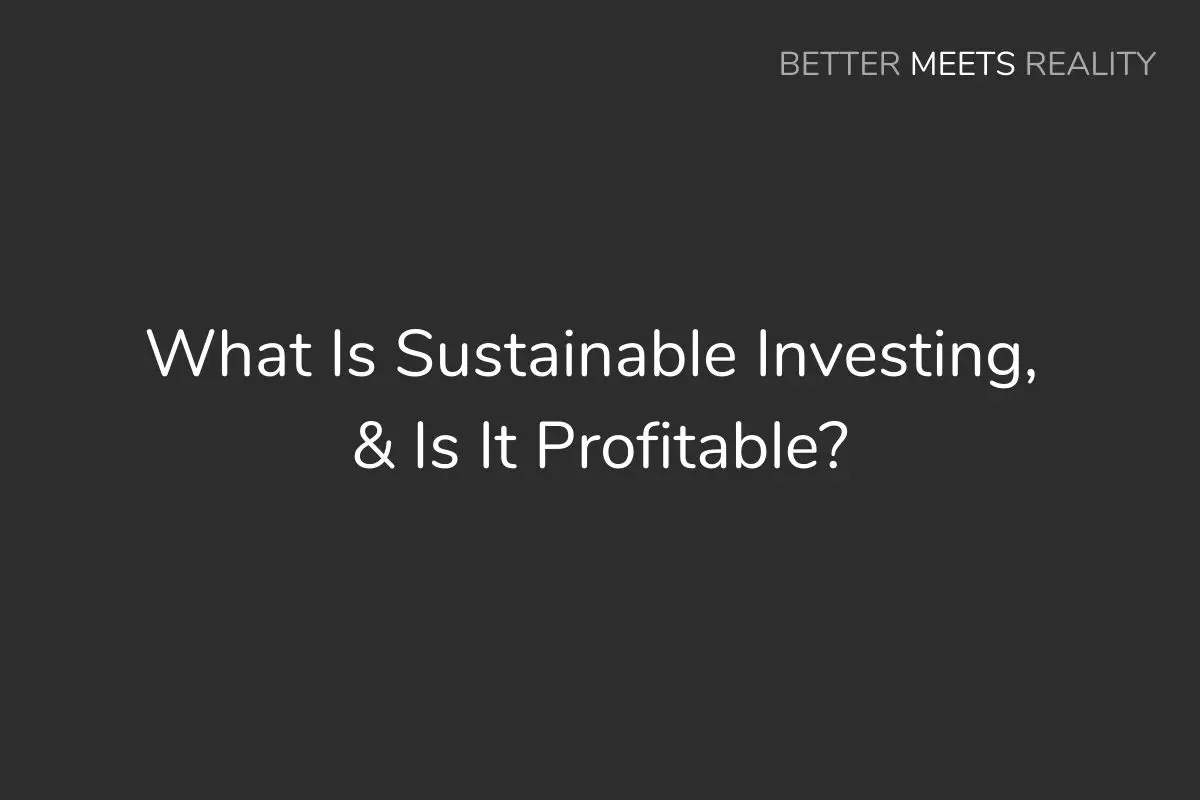This is a basic introductory guide to sustainable investing.
We outline what sustainable investing is in a general sense, and also whether it might be profitable as an investing strategy.
(*Note – this is general information only. It is not professional financial advice, or a substitute for professional financial advice. We are not financial experts. Please see a qualified financial expert for a professional opinion on your finances.)
Summary – Sustainable Investing
Sustainable investing comes under the ‘socially responsible investing’ or ‘ethical investing’ banner, and some definitions consider them to be the same thing
Traditional investing has had more of a focus on mainly the economic return for investors
Sustainable investing on the other hand might place more emphasis on factors such as environmental impact and impact on resource depletion of the companies being invested in
Socially responsible investing or ethical investing also considers things such as the ethics of the companies, their social impact, and corporate responsibility in different areas
Whether or not sustainable investing is profitable obviously depends on the individual investor’s investing strategy – there will be different variables and outcomes with each strategy
There are currently investment funds with positive historical returns and profits, that have socially responsible or sustainable investing as part of their core values and strategy
It might then be accurate to say that sustainable or ethical investing can be profitable, as long as an investor has the right investing strategy
So, it would be up to the individual investor to pick values that are important to them (everyone might have a different idea of what values are important), research an investment strategy, do due diligence on important factors such as past performance (as a potential indicator for future forecasts), risk, and returns/profits, and invest their money if they feel comfortable with what they have researched
What Is Sustainable Investing?
Some consider sustainable investing to be different to socially responsible investing, whilst others consider them to be the same thing (or close to it).
Beyond the traditional approach to investing of focussing primarily on financial return, sustainable investing might:
– Reduce negative environmental impact (one example might be reducing greenhouse gas emissions)
– Mange natural resources in a sustainable way, or use renewable resource over non renewable resources (such as the use of fossil fuel vs renewable energy sources)
If you want to add in the components of socially responsible or ethical investing, other factors or values that might be considered might be:
– Ensuring individuals have basic rights protected, or have access to safe and adequate working conditions
– Ensuring certain social groups are adequately protected or given equal opportunity
– Corporate responsibility to meet certain standards or guidelines
– Other ethics and values
Is Sustainable Investing Profitable?
Obviously in investing there are no guarantees
Profit/returns depends on each individual investing strategy, and external factors like what happens in the market in the future, amongst other factors.
If we take an investment fund as an example, one factor to look at to get an idea of what profitability might look like might be historical performance and returns.
Past performance does not guarantee future performance, but it might be one of the indicators some people find useful or important for their own investing strategy.
What we saw with returns, by looking at a few different types of managed investment funds labelled ‘sustainable’, ‘ethical’ or ‘socially responsible’, was:
– Fund A – ‘Delivered 7.1% pa over 5 years’ (net of fees)
– Fund B – ‘Delivered 8.6% pa over 5 years’ (net of fees)
– Fund C – ‘Delivered 11.3% pa over 5 years’ (net of fees)
We also looked at one individual publicly trading company that we would consider to offer products with ‘sustainable’ features, and that company has seen the company share price grow over the last few years to a decade.
So, at least on the surface level (without going into deeper detail about what is included in the fund, and so on), it might be accurate to say some types of sustainable investing can be profitable.
There can obviously be different types of investment funds, and stocks are obviously not the only type of asset class you can invest in.
These are all obviously further variables to an investing strategy.
Sustainable Investing vs Traditional Investing – Comparing Types Of Investing
The above numbers are obviously very general.
To compare sustainable investing to traditional investing and other types of investing, you’d want to analyze and compare two of the same types of investment funds alongside each other – one traditional, and the other ‘ethical’.
You’d want to look at things such as what’s included in the fund (composition of the portfolio), historical returns, fees, how diversified it is, risk, and so on.
Look at both the similarities, and the differences.
With an ‘ethical’ fund, you’d obviously want to look at the exact values and ethics that are part of the investing strategy to make sure they line up with yours.
It’s possible some ‘ethical’ funds may outperform some traditional funds, and vice versa.
theguardian.com suggests that ethical funds are beating traditional funds according to some metrics in some countries
cnbc.com also suggest ‘sustainable funds provide returns comparable to traditional funds in addition to lower risk’
But, always do your own analysis and due diligence on your own investing strategy, and see a qualified financial/investing professional for an expert opinion if you feel you need one.
ESG, & Responsible Investing
The wikipedia.org guide listed in the ‘Sources’ list below also contains some good information about ESG investing and responsible investing
Sources
1. https://www.theguardian.com/money/2020/jun/13/ethical-investments-are-outperforming-traditional-funds
2. https://www.cnbc.com/2020/11/05/sustainable-investing-is-surging-how-to-decide-if-its-right-for-you.html
3. https://en.wikipedia.org/wiki/Environmental,_social,_and_corporate_governance#Disclosure_and_regulation
','' ); } ?>